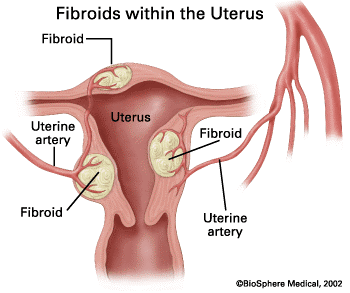What are Fibroids?
Fibroids are tumors that grow in the uterus (womb). Another medical term for fibroids is "leiomyoma" (leye-oh-meye-OH-muh) or just "myoma". Fibroids are almost always non cancerous. Women can have a single fibroid or there can be many of them in the uterus. Fibroids can be as small as an apple seed or as big as a grapefruit. In unusual cases they can become very large.
Fibroids become more common as women age, especially during the 30s and 40s through menopause. After menopause, fibroids usually shrink. Not all women with fibroids have symptoms. However, women who do have symptoms often find fibroids hard to live with. Some have pain and heavy menstrual bleeding. Fibroids also can put pressure on the bladder that causes frequent urination, or pressure on the rectum that could cause constipation. Should the fibroids get very large, they can cause the abdomen (stomach area) to enlarge, making a woman look pregnant. Fibroids can also cause women to have pain during sex, reproductive problems, and complications during pregnancy and labor, including a greater risk of miscarriage and cesarean section.
No one knows for sure what causes fibroids to develop and we also don't know what causes them to grow or shrink. African Americans are more likely to have fibroids than whites, but the reasons for this are not known.
To date, research findings indicate that:
- Having a family member with fibroids may increase your risk
- Being overweight may be at higher risk for fibroids.
- Alcohol has been linked to increased risk
- Exercise may decrease risk
- Vitamin D, the vitamin from sunshine, may decrease risk

 Back to Top
Back to Top



